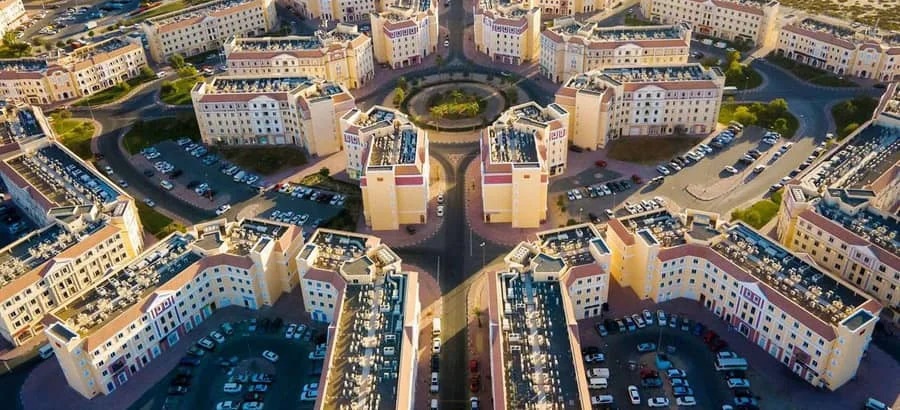Dubai vs Abu Dhabi: Which City Is More Affordable to Live In?
Friday, 23 May 2025
Whether you’re relocating to the UAE or considering a move between emirates, deciding between living in Dubai or Abu Dhabi can be challenging—both cities promise an exceptional lifestyle. To help simplify your decision, it’s important to explore and compare the cost of living in each city. In this guide, we break down the differences in expenses for housing, utilities, education, transportation, and more to help you make an informed decision.
Table of Contents
- Essential Living Costs: Dubai vs Abu Dhabi
- Grocery Costs in Dubai vs Abu Dhabi
- Utilities: Dubai vs Abu Dhabi
- Education: Dubai vs Abu Dhabi
- Healthcare: Dubai vs Abu Dhabi
- Transportation Costs: Abu Dhabi vs Dubai
- House Help in the UAE
- Frequently asked questions
Essential Living Costs: Dubai vs Abu Dhabi
Before diving into a detailed comparison, let’s first look at the basic cost of living in Dubai and Abu Dhabi. This includes essential monthly expenses such as housing, groceries, and utilities, categorized by family size.
So, let’s explore how the cost of living varies between these two major UAE cities.
Housing Costs in Dubai vs Abu Dhabi

One of the most significant factors influencing the cost of living in any city is housing. Whether you’re renting or buying, the affordability of accommodation plays a key role in deciding between Dubai and Abu Dhabi.
Both emirates offer a wide range of residential options—from affordable apartments to high-end luxury villas—making it possible to find homes that suit various budgets and lifestyles.
Here’s a breakdown of housing trends and popular areas in both cities:
Affordable Housing Areas
Abu Dhabi:
- Mohammed Bin Zayed City – Known for spacious yet budget-friendly apartments and villas.
- Mussafah – Offers economical living options, especially for working professionals.
- Al Reef – A family-friendly community with mid-range housing.
Dubai:
- DAMAC Hills 2 – Offers a suburban lifestyle at relatively low rental rates.
- Jumeirah Village Circle (JVC) – Popular among families and young professionals for its affordability and community vibe.
- Dubai Sports City – A cost-effective option with sports facilities and residential towers.
Premium and Luxury Areas
Abu Dhabi:
- Al Reem Island – A high-end waterfront development with luxury apartments and modern amenities.
- Saadiyat Island – Known for upscale villas and apartments close to cultural landmarks and pristine beaches.
Dubai:
- Downtown Dubai – Offers a premium lifestyle near iconic landmarks like Burj Khalifa and The Dubai Mall.
- Dubai Marina – Popular for waterfront living with luxurious high-rises and vibrant nightlife.
Whether you’re looking for budget-friendly options or luxurious living, both Dubai and Abu Dhabi provide diverse choices tailored to various needs.
Rental and Sales Trends: Dubai vs Abu Dhabi
To give you a clearer understanding of the housing market, we’ve put together a comparison table highlighting the rental and sales trends in both cities. Below is a breakdown of average rental prices for apartments in Dubai and Abu Dhabi, categorized by the number of bedrooms.
| Apartment Bed Types | Average Rent in Dubai | Average Rent in Abu Dhabi |
|---|---|---|
| Studios | AED 52,000 | AED 30,000 |
| 1-bed | AED 91,000 | AED 59,000 |
| 2-bed | AED 150,000 | AED 92,000 |
| 3-bed | AED 254,000 | AED 124,000 |
| 4-bed | AED 487,000 | AED 159,000 |
Here’s a closer look at the extra costs that come with renting a home in Dubai.
Alternatively, if you’re planning to settle down long-term, here’s what you can expect to pay when purchasing an apartment in your preferred city.
| Apartment Bed Types | Average Sales Price in Dubai | Average Sales Price in Abu Dhabi |
|---|---|---|
| Studios | AED 790,000 | AED 718,000 |
| 1-bed | AED 1,551,000 | AED 1,050,000 |
| 2-bed | AED 3,017,000 | AED 1,702,000 |
| 3-bed | AED 5,293,000 | AED 2,774,000 |
| 4-bed | AED 14,649,000 | AED 6,748,000 |
Grocery Costs in Dubai vs Abu Dhabi

Grocery shopping is a key component of monthly living expenses, and it’s an important factor when comparing the cost of living in Dubai and Abu Dhabi. While individual grocery bills can vary based on lifestyle, diet, and shopping habits, the overall cost of staple items is relatively consistent across both emirates.
Key Points to Consider
- Similar Pricing for Essentials
The cost of everyday items like rice, milk, bread, and vegetables is nearly the same in both cities. - Popular Budget-Friendly Supermarkets
- Carrefour – Widely available in both emirates, offering competitive prices on groceries and household goods.
- Lulu Hypermarket – Known for affordability and variety, especially for bulk shopping and multicultural food items.
- Premium Grocery Stores
- Waitrose – Offers a wide range of imported and organic products, usually at higher prices.
- Al Maya Supermarket – Known for international brands and specialty products, but tends to be more expensive than local chains.
Takeaway
If you stick to mainstream supermarkets like Carrefour and Lulu, your grocery costs will be affordable and similar in both Dubai and Abu Dhabi. However, opting for premium stores or imported goods will increase your expenses, no matter the city.
| Grocery Items | Prices in Dubai | Prices in Abu Dhabi |
|---|---|---|
| Milk (1 Litre) | AED 6.85 | AED 6.65 |
| Loaf of Fresh White Bread (500g) | AED 5.35 | AED 4.95 |
| Rice (1kg) | AED 8.81 | AED 8.28 |
| Eggs (12) | AED 12.19 | AED 11.66 |
| Local Cheese (1kg) | AED 32.75 | AED 32.94 |
| Chicken Fillets (1kg) | AED 31.64 | AED 29.21 |
| Beef Round (1kg) | AED 41.05 | AED 44.05 |
| Apples (1kg) | AED 9.00 | AED 8.12 |
| Banana (1kg) | AED 6.77 | AED 6.44 |
| Oranges (1kg) | AED 7.31 | AED 6.48 |
| Tomato (1kg) | AED 5.98 | AED 5.39 |
| Potato (1kg) | AED 4.30 | AED 3.98 |
| Onion (1kg) | AED 5.57 | AED 5.10 |
| Lettuce (1 head) | AED 5.77 | AED 6.79 |
Utilities: Dubai vs Abu Dhabi

In addition to rent, utility costs are an important consideration for residents in both Dubai and Abu Dhabi. Utilities include services such as electricity, water, mobile, and internet. Here’s a closer look at the utility expenses in both cities.
Electricity and Water
- Abu Dhabi
- The Abu Dhabi Distribution Company (ADDC) manages electricity and water services.
- Monthly utility bills typically range from AED 370 to AED 1,000 in apartments.
- Villas in Abu Dhabi tend to have higher utility bills due to larger living spaces.
- Dubai
- Utility services are provided by the Dubai Electricity and Water Authority (DEWA).
- Utility bills in Dubai range from AED 500 to AED 1,100 per month for apartments.
- Villas in Dubai also face higher utility costs.
Mobile and Internet Services
- Mobile Plans
- Mobile services in both cities are provided by Etisalat and du, with similar pricing.
- Postpaid mobile plans start at AED 250 per year and can go up to AED 1,000, depending on the data and call packages.
- Internet and TV Packages
- Both cities offer similar pricing for TV and internet services, typically starting at AED 400 per month for basic packages.
Summary
- Electricity and water costs are generally lower in Abu Dhabi compared to Dubai, but both cities have higher bills for villas.
- Mobile and internet services are priced similarly across both cities, with comparable options from Etisalat and du.
Education: Dubai vs Abu Dhabi

For families with children, education is a major expense to consider when evaluating the cost of living in Dubai and Abu Dhabi. Tuition fees can vary significantly depending on the school and curriculum, so understanding the average cost of schooling in each city is crucial for making an informed decision.
Schooling Options
- Private Schools
- Both cities have a wide range of private schools, which are the preferred choice for most expat families.
- The most common curricula offered include British, American, IB, and Indian systems.
Key Insights
- Cost Difference
- Schools offering the Indian and British curricula tend to be more expensive in Dubai compared to Abu Dhabi.
- American and IB schools also show slightly higher tuition fees in Dubai than in Abu Dhabi.
- Diverse Options
- Both emirates offer a wide variety of schooling options, allowing families to choose according to their budget and curriculum preference.
Summary
Education costs in both Dubai and Abu Dhabi can be substantial, but there are options to suit various budgets. While Dubai generally has higher tuition fees, both cities offer excellent private schooling choices for expat families.
| Curriculum | Annual Tuition Fee (Dubai) | Annual Tuition Fee (Abu Dhabi) |
|---|---|---|
| Indian | AED 10,000 – AED 35,000 | AED 10,000 – AED 30,000 |
| British | AED 18,000 – AED 90,000 | AED 20,000 – AED 80,000 |
| American | AED 19,000 – AED 95,000 | AED 25,000 – AED 100,000 |
| International Baccalaureate | AED 45,000 – AED 130,000 | AED 50,000 – AED 150,000 |
Healthcare: Dubai vs Abu Dhabi

Healthcare is an essential consideration when calculating the cost of living in Dubai and Abu Dhabi. Residents are required to have health insurance, and the cost will vary depending on factors such as the level of coverage, number of dependents, and type of plan chosen. For those on an investor visa or those whose employers do not provide family insurance, purchasing individual or family health insurance is a must.
Health Insurance Overview
- Insurance Requirement
- All residents in both Dubai and Abu Dhabi must have health insurance.
- If you are on an investor visa or your employer doesn’t offer coverage, you will need to arrange medical insurance for yourself and your family.
- Insurance Premiums
- Premiums are fairly similar across both emirates but will vary based on the plan and coverage options.
Cost of Health Insurance
- Basic Health Insurance Plans
- In Dubai, the Essential Benefits Plan costs between AED 650 to AED 725 per year.
- This plan covers the most essential medical services but may have restrictions on coverage.
- Comprehensive Health Insurance Plans
- For a single person, more comprehensive coverage ranges from AED 4,000 to AED 7,000 annually.
- A family of four can expect to pay AED 17,000 for basic coverage, with prices rising to AED 65,000 to AED 70,000 for worldwide coverage and additional benefits.
Top Insurance Providers
- Dubai
- Popular medical insurance companies include Dubai Health Authority (DHA) accredited providers, AXA, Bupa Global, and MetLife.
- Abu Dhabi
- Major insurance providers in Abu Dhabi include ADNIC, Oman Insurance, Aetna, and National Health Insurance Company (Daman).
Summary
- Health insurance premiums in Dubai and Abu Dhabi are quite similar, with costs varying based on the type of coverage and number of dependents.
- Basic plans are more affordable, while comprehensive plans and family coverage can be more expensive, particularly with additional international benefits.
Transportation Costs: Abu Dhabi vs Dubai

When comparing the cost of living between Abu Dhabi and Dubai, transportation is an important factor to consider. While many residents in both emirates prefer using private vehicles, public transportation is also a popular and cost-effective option, especially in Dubai.
Private Vehicles
- Widely used in both cities.
- Fuel costs are the same in both emirates and cheaper than in many countries.
Public Transport in Dubai
- Well-developed network: Metro, Tram, buses, taxis, and ferry.
- Silver NOL Card (Monthly): AED 140
- Gold NOL Card (Monthly): AED 280
Public Transport in Abu Dhabi
- Includes public buses and taxis.
- Monthly Bus Pass: AED 95
Cost Comparison
- Abu Dhabi offers cheaper public transport.
- Dubai provides more transport options and wider coverage.
House Help in the UAE

Hiring house help is common and relatively affordable in the UAE compared to many other countries. Expats can choose between full-time or part-time assistance, but costs vary based on the arrangement.
Full-Time House Help
- Requires sponsorship and medical insurance by the employer.
- Agency Visa Cost: AED 8,500
- Sponsoring a Maid Visa: AED 17,000
- Monthly Salary: AED 1,500 – AED 3,500
- May increase if accommodation isn’t provided.
Part-Time House Help
- Offered through registered agencies.
- Hourly Rate: AED 35 – AED 50
Note
- Costs are similar in both Dubai and Abu Dhabi.
Entertainment: Abu Dhabi vs Dubai
Both Dubai and Abu Dhabi offer a wide range of entertainment options, from luxury dining and beaches to malls, cinemas, and parks. Entertainment costs are fairly similar in both cities.
Common Entertainment Options
- Fine-dining restaurants
- Public beaches and parks
- Shopping malls and cinemas
- Theme parks and attractions
Estimated Costs
- Cinema Ticket: AED 35 – AED 50
- Meal for Two (Mid-range Restaurant): AED 230 – AED 300
- Public Park Entry: AED 1 – AED 10 per person
Note
- Entertainment costs are comparable in both Dubai and Abu Dhabi.
- Budgeting for weekends and holidays is recommended.
While both Dubai and Abu Dhabi offer excellent living standards, Abu Dhabi is generally more affordable, especially in terms of housing, utilities, and transport. Dubai, though slightly more expensive, provides broader job opportunities and lifestyle choices. Your ideal city will depend on your personal needs, budget, and priorities.
Frequently Asked Questions (FAQs)
Is Dubai more expensive than Abu Dhabi?
Yes, overall Dubai tends to be slightly more expensive, particularly for housing and private schooling, while Abu Dhabi offers more budget-friendly living options.
Which city is better for families: Dubai or Abu Dhabi?
Abu Dhabi is often considered better for families due to quieter neighborhoods and slightly lower living costs, while Dubai offers more schooling options and family entertainment.
Are groceries cheaper in Abu Dhabi than in Dubai?
Yes, groceries are marginally cheaper in Abu Dhabi, though the difference in prices for most essential items is minimal.
Which city has better public transportation?
Dubai has a more advanced and extensive public transport system including metro, tram, and ferries, while Abu Dhabi has a more affordable but limited bus network.
Is healthcare cost the same in both cities?
Yes, healthcare and insurance costs are quite similar in both Dubai and Abu Dhabi, depending on the level of coverage.





